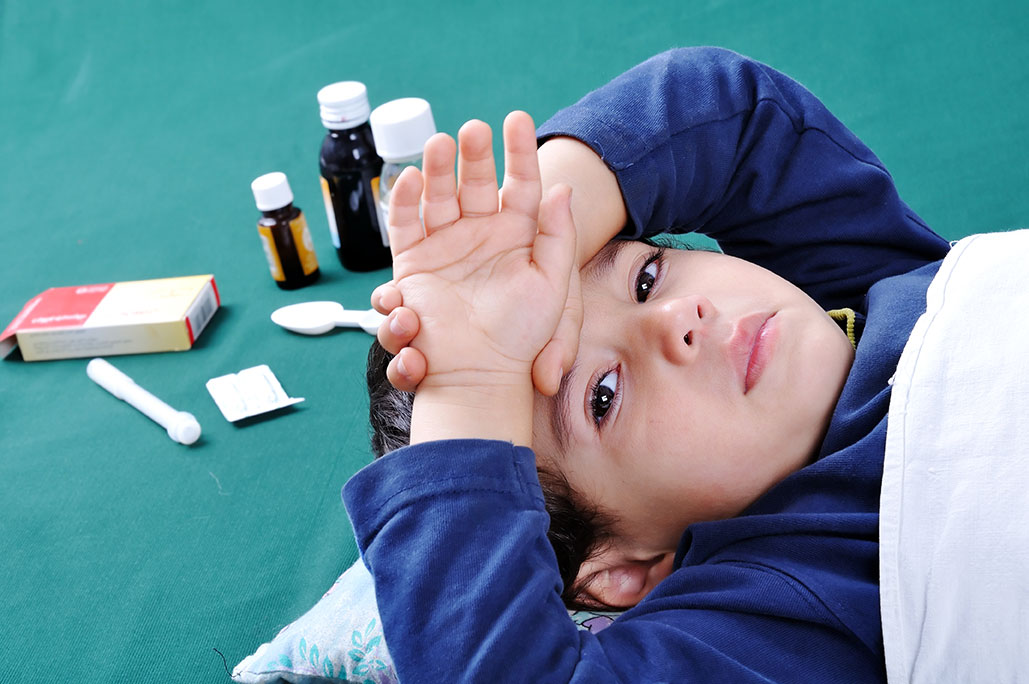
Photo via DepositPhotos.com
Photo via DepositPhotos.com
School nurse Belinda Strickland heard a common refrain from parents in Longmont when a child got sick at school, and parents were called to pick the kid up: “I can’t come because I will lose my job.”
Parents employed by the town’s old turkey processing plant, as well as by other businesses, didn’t have time off to take care of sick children, and if they left work they were afraid they’d be replaced. Sometimes a sick student’s grandparent was available, Strickland said, but often the children spent the rest of the day in the school health room. In other cases, the phone numbers of a child’s emergency contacts had been disconnected, so he or she had to tough it out until dismissal.
Many parents have been here before: You get a call from school requesting an early pick-up, but work responsibilities or a lack of alternate child care get in the way of bringing him or her home.
Childhood sick days are a health equity challenge, not just a quandary for parents who may or may not get paid time off from work. One study found that children of parents with paid sick time are more likely to access medical care, and parents are less likely to have the benefit depending on their level of education, socio-economic status and ethnic background. While all children get colds, low-income parents and some parents of color face a higher cost to take care of their children because they are more likely to lack paid sick days.
In Colorado, more than 42 percent of workers do not have access to paid sick leave, according to estimates from the Institute for Women’s Policy Research. Nationally, the institute estimates that employed Latinos, American Indians and Alaska Natives are less likely than other ethnic groups to have paid sick days, and immigrants are less likely to have them than non-immigrants. Children whose parents work less than full time or for small employers are also less likely to have a parent available to take time off when they’re sick.
Gloria Martinez of Lakewood, Colo., a single mother of three, didn’t have paid sick days at her jobs cleaning houses and hotel rooms. But that didn’t stop her 8-year-old daughter from getting sick, just like everyone else’s children, she said.
Sometimes, Martinez’s employer would let her leave to pick up her daughter, but sometimes not, leaving her to scramble to find someone else, like a neighbor, who could step in. When she did leave, Martinez said she wasn’t paid.
“It’s a loss [of income],” she said. “You have to respond if you don’t have anyone else supporting you.”
In the past few years, public health researchers have found clear links between parents’ paid sick leave and their children’s access to care.
Research published this year by the National Institute for Occupational Safety and Health (NIOSH) found having parents with access to paid sick leave was associated with a higher likelihood that children would receive flu vaccinations and yearly medical checkups. A similar study last year found a mother’s paid sick leave was also associated with her children receiving preventive dental care.
A big problem is scheduling conflicts between providers’ and parents’ work schedules, NIOSH researcher Abay Asfaw said. The study found parents without paid sick leave were more likely to take their children to the emergency room after normal work hours.
“It’s easier to take them to an emergency room without losing money from work,” he said.
The biggest gaps in paid sick leave were for Hispanic households and those with low education and income levels, Asfaw said. The study suggested that increasing the prevalence of paid sick leave could reduce delayed medical care and emergency department visits.
Colorado has no paid sick leave laws. In 2011, Denver voters rejected a paid sick leave proposal, which was opposed by business groups and supported by women’s and low-income workers’ groups. Last year, a Colorado bill requiring private employers to provide paid sick leave, known as the “Healthy Families and Workplaces Act,” was postponed indefinitely by a state Senate committee.
Sending children to school sick might delay a medical evaluation and treatment and increase the chances of infecting other people, said pediatrician James Feinstein, MD, MPH of Children’s Hospital Colorado.
If parents don’t have paid sick days, Feinstein said parents can call a primary care provider’s office or speak to a triage nurse to get help assessing the severity of their child’s symptoms.
Navigating childhood sick days could be more challenging for people who don’t speak English well and have to communicate the issue with an employer, school and doctor’s office, Feinstein said, or for people who live in a rural area with farther to travel to receive medical attention.
Eventually, Martinez said she would love a job that would let her leave to take care of her children when needed without worrying about lost pay.
“It’s not a luxury, it’s a human need,” Martinez said.